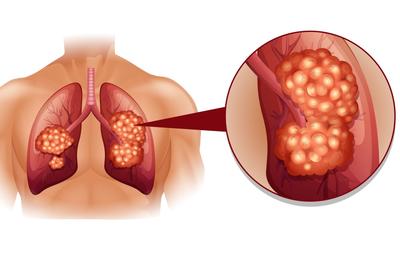
Diagnosed with Cancer? Your two greatest challenges are understanding cancer and understanding possible side effects from chemo and radiation. Knowledge is Power!
Learn about conventional, complementary, and integrative therapies.
Dealing with treatment side effects? Learn about evidence-based therapies to alleviate your symptoms.
Click the orange button to the right to learn more.
- You are here:
- Home »
- Blog »
- non-conventional therapies »
- Fish Oil, Lung Cancer Response by 60%
Fish Oil, Lung Cancer Response by 60%

“Adding fish oil resulted in a greater response rate at 60% compared with 25.8% with the SOC…Overall survival at 1 year trended toward improvement with fish oil compared with SOC”
If conventional oncology could cure lung cancer then there would be no need for integrative lung cancer therapies such as omega-3 fatty acids aka fish oil.
But as most people know, standard of care (SOC) chemo for lung cancer, carboplatin with vinorelbine or gemcitabine, often don’t work and can cause a host of negative side effects.
According to the studies linked and excepted below, fish oil increased the response of lung cancer patients to SOC chemotherapy regimens in addition to improving overall survival of patients supplementing with fish oil.
At the same time, omega-3 fatty acids help to manage possible side effects of chemo such as cachexia and inflammation.
I am both a long-term cancer survivor and cancer coach. My personal experience combined with years of research and working with cancer patients has taught me that treating complicated, aggressive cancers such as lung cancer requires both conventional (FDA approved) and evidence-based, non-conventional therapies such as fish oil. In short, lung cancer patients need every evidence-based weapon they can get their hands on.
I supplement with Life Extension Super Omega 3 because it has been evaluated and approved by Consumerlab.com.
Have you been diagnosed with lung cancer? Please scroll down the page, post a question or comment and I will reply to you ASAP.
Thank you,
David Emerson
- Cancer Survivor
- Cancer Coach
- Director PeopleBeatingCancer
“Fish oil is a dietary supplement that contains omega-3 fatty acids, particularly eicosapentaenoic acid (EPA) and docosahexaenoic acid (DHA), though in doses that vary widely among brands…
Fish oil is a very popular supplement, with its use estimated among 7.8% of adults and 1.1% of children in the United States during a given 30-day period.2 Research has evaluated the role of fish oil to reduce cancer incidence and improve cancer outcomes by preventing toxicity or treating cancer- or treatment-associated side effects…
Anticancer Treatment: Outcomes and Quality of Life
Multiple trials demonstrated that fish oil supplementation can improve outcomes during or after cancer treatment, such as improved response rate, increased function, and improved quality of life…
Improvement With Systemic Anticancer Treatment
A small RCT of 46 patients with non–small cell lung cancer (NSCLC) received fish oil (2.5 g EPA and DHA) in addition to the standard of care (SOC) chemotherapy (carboplatin with vinorelbine or gemcitabine).5 Adding fish oil resulted in a greater response rate at 60% compared with 25.8% with the SOC (P = .008). Clinical benefit was also greater in the fish oil group compared with the SOC group (80% vs 41.9%; P = .02). Overall survival at 1 year trended toward improvement with fish oil compared with SOC…
Conclusions
Fish oil supplementation may improve chemotherapy-related outcomes, such as time to tumor progression, and may be protective against certain toxicities..”
Omega-3 Polyunsaturated Fatty Acids and Lung Cancer: nutrition or Pharmacology?
“Omega-3 polyunsaturated fatty acid (ω-3 PUFA) supplements for chemoprevention of different types of cancer including lung cancer has been investigated in recent years.
ω-3 PUFAs are considered immunonutrients, commonly used in the nutritional therapy of cancer patients. ω-3 PUFAs play essential roles in cell signaling and in cell structure and fluidity of membranes. They participate in the resolution of inflammation and have anti-inflammatory effects.
Lung cancer patients suffer complications, such as anorexia-cachexia syndrome, pain and depression. The European Society for Clinical Nutrition and Metabolism (ESPEN) 2017 guidelines for cancer patients only discuss the use of ω-3 PUFAs for cancer-cachexia treatment, leaving aside other cancer-related complications that could potentially be managed by ω-3 PUFAs.
This review aims to elucidate whether the effects of ω-3 PUFAs in lung cancer is supplementary, pharmacological or both. In addition, clinical studies, evidence in cell lines and animal models suggest how ω-3 PUFAs induce anticancer effects.
ω-3 PUFAs and their metabolites are suggested to modulate pivotal pathways underlying the progression or complications of lung cancer, indicating that this is a promising field to be explored. Further investigation is still required to analyze the benefits of ω-3 PUFAs as supplementation or pharmacological treatment in lung cancer.”


